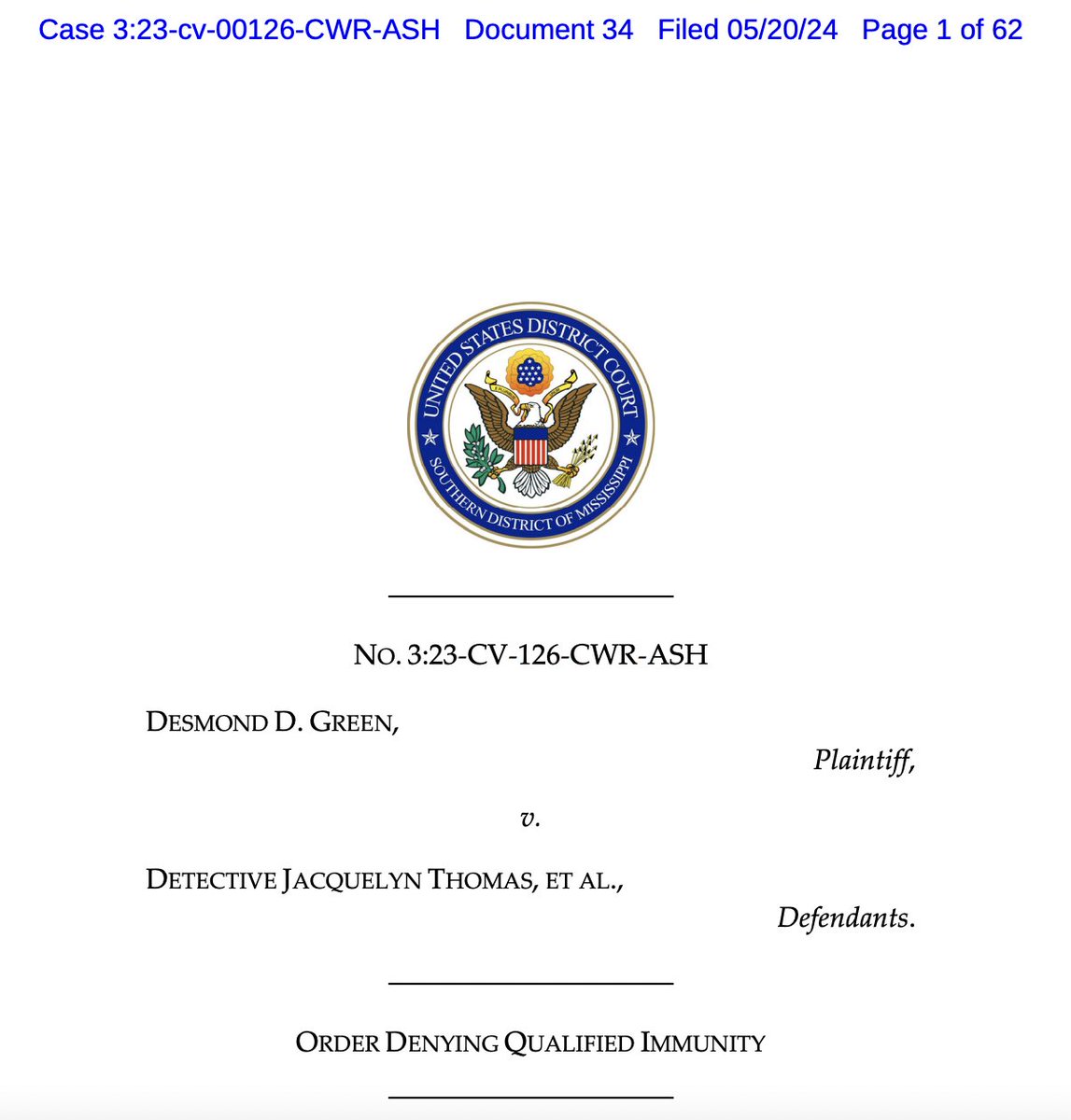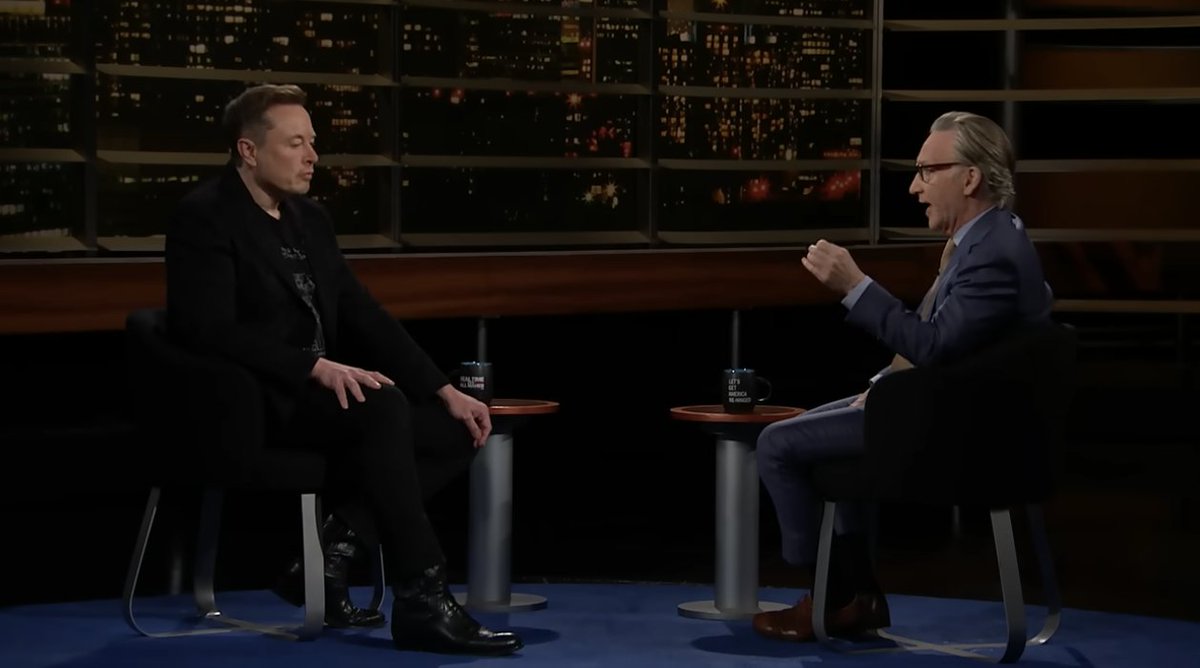1. On Monday, a federal judge dropped an extraordinarily important decision.
It has received ZERO media attention.
In 1871, Congress passed the Ku Klux Klan Act, which allowed people to sue law enforcement officers who violated their Constitutional rights. It was intended to curb white supremacist violence against Black Americans.
In 1967, the Supreme Court flipped it on its head.
They "interpreted" the Ku Klux Klan Act to provide "qualified immunity" to law enforcement officers who violate Constitutional rights in "good faith." It has allowed law enforcement officers who abuse their power to escape accountability.
A federal judge, Carlton Reeves, just issued a powerful ruling urging the Supreme Court to acknowledge its mistake and repeal the doctrine of qualified immunity.
Follow along if interested.
🧵
It has received ZERO media attention.
In 1871, Congress passed the Ku Klux Klan Act, which allowed people to sue law enforcement officers who violated their Constitutional rights. It was intended to curb white supremacist violence against Black Americans.
In 1967, the Supreme Court flipped it on its head.
They "interpreted" the Ku Klux Klan Act to provide "qualified immunity" to law enforcement officers who violate Constitutional rights in "good faith." It has allowed law enforcement officers who abuse their power to escape accountability.
A federal judge, Carlton Reeves, just issued a powerful ruling urging the Supreme Court to acknowledge its mistake and repeal the doctrine of qualified immunity.
Follow along if interested.
🧵

2. Here are the basics of the case before Reeves:
On February 13, 2020, Nicholas Robertson was shot in Jackson, Mississippi.
Two months later, Samuel Jennings was arrested for burglary and grand larceny in an unrelated incident.
Jennings provided Thomas with a rambling written statement pinning the blame for Robertson's murder on a man named Desmond Green.
Thomas used this uncorroborated statement to convince a grand jury to indict Green for murder.
On February 13, 2020, Nicholas Robertson was shot in Jackson, Mississippi.
Two months later, Samuel Jennings was arrested for burglary and grand larceny in an unrelated incident.
Jennings provided Thomas with a rambling written statement pinning the blame for Robertson's murder on a man named Desmond Green.
Thomas used this uncorroborated statement to convince a grand jury to indict Green for murder.

3. For 22 months, Green was held in a jail "full of violence, rodents, and moldy food." According to Green, he "often did not have a mattress, or even a pad, to sleep on." Green said he "constantly feared for his life."
But Green was indicted on a lie.
popular.info/p/an-extraordi…
But Green was indicted on a lie.
popular.info/p/an-extraordi…
4. Jennings recanted his story in March 2022. Jennings said that when he made the statement, he was high on meth and provided the written statement to Thomas "to help myself get out of jail."
Jennings also said Thomas coached him to pick Green out of a lineup.
Jennings also said Thomas coached him to pick Green out of a lineup.
5. Green was finally released from jail on April 21, 2022.
In February 2023, Green sued Thomas, alleging that the detective violated his Constitutional rights under the Fourth and Fourteenth Amendments.
Thomas moved to dismiss the case, citing "qualified immunity."
In February 2023, Green sued Thomas, alleging that the detective violated his Constitutional rights under the Fourth and Fourteenth Amendments.
Thomas moved to dismiss the case, citing "qualified immunity."
6. What is qualified immunity? It's something that was invented by the Supreme Court in 1967.
It "protects public officials from liability for civil damages insofar as their conduct does not violate clearly established statutory or constitutional rights."
WTF does that mean?
It "protects public officials from liability for civil damages insofar as their conduct does not violate clearly established statutory or constitutional rights."
WTF does that mean?
7. Courts have found that a clearly established right "is one that is sufficiently clear that every reasonable official would have understood that what he is doing violates that right."
popular.info/p/an-extraordi…
popular.info/p/an-extraordi…
8. In practice, qualified immunity has given a free pass to law enforcement officers who engaged in egregious violations of Constitutional rights.
Some examples:
Courts let correctional officers spray some chemical agent in a person's face “for no reason at all,” because it was only clearly established that guards could not use “the full can of spray.” McCoy v. Alam (2020)
Courts let police officers who were inside a car kill a person who didn't warrant lethal force. The law clearly established only that an officer could not shoot a person from outside a car. Stewart v. City of Euclid, Ohio (2020).
A court let five police officers shoot a man 22 times as he lay motionless on the ground, after tasing him four times, kicking him, and placing him in a chokehold. It was not clearly established that officers could not shoot a motionless person who possessed a knife. Estate of Jones v. City of Martinsburg (2018).
Courts let a correctional officer watch a suicidal detainee strangle himself to death with a telephone cord, after officials placed him in the cell, with the cord, knowing he was unstable and had repeatedly attempted suicide. It was not clearly established that correctional officers who watch a person attempt suicide had to “call for emergency medical assistance.” Cope v. Cogdill (2021).
Some examples:
Courts let correctional officers spray some chemical agent in a person's face “for no reason at all,” because it was only clearly established that guards could not use “the full can of spray.” McCoy v. Alam (2020)
Courts let police officers who were inside a car kill a person who didn't warrant lethal force. The law clearly established only that an officer could not shoot a person from outside a car. Stewart v. City of Euclid, Ohio (2020).
A court let five police officers shoot a man 22 times as he lay motionless on the ground, after tasing him four times, kicking him, and placing him in a chokehold. It was not clearly established that officers could not shoot a motionless person who possessed a knife. Estate of Jones v. City of Martinsburg (2018).
Courts let a correctional officer watch a suicidal detainee strangle himself to death with a telephone cord, after officials placed him in the cell, with the cord, knowing he was unstable and had repeatedly attempted suicide. It was not clearly established that correctional officers who watch a person attempt suicide had to “call for emergency medical assistance.” Cope v. Cogdill (2021).
9. Reeves ruled that the doctrine of qualified immunity itself is legally unsound and should be discarded. Qualified immunity does not appear in the Ku Klux Klan Act or the Constitution. Reeves argues that if Congress wanted to give law enforcement officers qualified immunity, it could pass legislation. But Congress chose not to do so.
10. Reeves notes that the case for eliminating qualified immunity is stronger than the case for eliminating abortion rights. In Roe, the Supreme Court created a Constitutional framework around an issue where Congress had not acted. In Pierson, the Supreme Court created qualified immunity and negated a standard explicitly established by Congress with the Ku Klux Klan Act. It should be much easier, Reeves says, for the Supreme Court to conclude that Pierson was "egregiously wrong from the day it was decided."
11. UCLA Law Professor Joanna C. Schwartz argues that the concept of qualified immunity for law enforcement based on "clearly established statutory or constitutional rights" is incoherent. Courts base these decisions on previous cases, but police officers "could never learn the facts and holdings of the hundreds or thousands of cases that clearly establish the law and, even if they learned about some of these cases, they would not reliably recall their facts and holdings while doing their jobs."
12. Reeves' ruling will certainly be appealed, potentially setting up a landmark case in the Supreme Court that could fundamentally change the relationship between law enforcement officers and the public.
popular.info/p/an-extraordi…
popular.info/p/an-extraordi…
13. For more independent reporting on critical issues that aren't covered elsewhere, subscribe to Popular Information.
There are no paywalls, and it's free to sign up.
popular.info/subscribe
There are no paywalls, and it's free to sign up.
popular.info/subscribe
• • •
Missing some Tweet in this thread? You can try to
force a refresh







